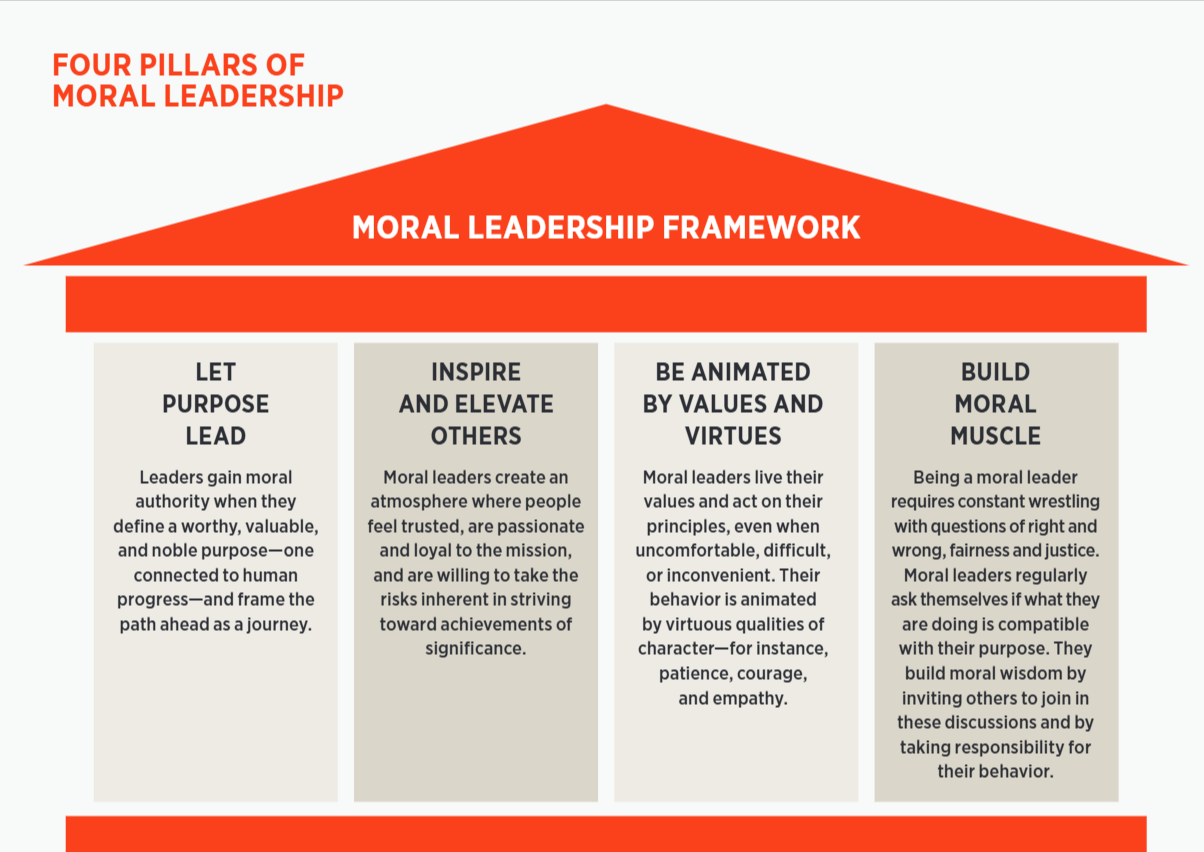Our Take on the Newest HOW Institutes Research on Moral Leadership
The 2025 State of Moral Leadership in Business report, published by The HOW Institute for Society, provides an in-depth analysis of the current landscape of moral leadership within organizations.
Drawing upon data from 2,500 U.S.-based employees, the report underscores the critical role that moral leadership plays in fostering organizational success and highlights a significant gap between the demand for such leadership and its actual presence in the business world.
The HOW defines moral leadership by 4 pillars:
Leading with purpose
Inspire and elevate others
Live your values
Building moral muscle
Key Findings From the Report:
Growing Demand vs. Limited Supply: The study reveals a heightened demand for moral leadership among employees and stakeholders. However, only 9% of CEOs and 11% of managers are identified as top-tier moral leaders, indicating a persistent shortage across various sectors.
Positive Organizational Impact: Organizations led by top-tier moral leaders experience notable benefits, including enhanced customer satisfaction and increased resilience during economic downturns. This suggests that moral leadership contributes significantly to both internal operations and external perceptions.
Empowerment Through Leadership: Moral leaders create environments that not only remove unnecessary constraints but also empower employees to express themselves, innovate, and excel in their roles.
Intentional Pausing: Effective moral leaders practice intentional pausing—taking moments to reflect, reconnect with core values, rethink assumptions, and reimagine solutions. This approach is linked to higher managerial effectiveness and better team dynamics.
Authentic Apologies: The report emphasizes the importance of leaders taking responsibility through sincere apologies when mistakes occur. Such actions demonstrate accountability and can strengthen trust within teams.
Need for Development Programs: Despite the clear benefits, only about two-thirds of respondents reported that their employers provide moral leadership training. This highlights a substantial opportunity for organizations to invest in developing these critical skills among their leaders.
The report goes onto conclude that cultivating moral leadership is imperative in today's complex business environment.
Organizations are encouraged to implement comprehensive development programs that focus on building moral authority, fostering cultures of integrity, and preparing leaders to navigate ethical challenges effectively.
Our Take—Leadership &
While the report provides valuable insights, further exploration reveals deeper implications and opportunities for organizations and leaders.
1. The Leadership Gap as a Competitive Advantage
With only 10% of CEOs and 13% of managers consistently exhibiting moral leadership behaviors, organizations that prioritize ethical leadership development can distinguish themselves in the marketplace.
Research indicates that companies led by ethical leaders can experience a performance boost of up to 25%, highlighting the tangible benefits of such an approach.
2. Ethical Leadership as a Catalyst for Employee Satisfaction and Retention
Employees today seek more than just a paycheck; they desire purpose and alignment with their organization's values.
Studies show that 70% of workers derive their purpose from their jobs, yet a third are dissatisfied. Leaders who bridge this purpose gap by operationalizing hope and creating a culture that prioritizes well-being over mere productivity can enhance performance and retention.
3. The Necessity for Effective Leadership Development Programs
The persistent shortage of moral leaders suggests that existing development programs may be inadequate. A Gartner study revealed that 64% of HR leaders believe their organization's current leadership development programs are ineffective in preparing leaders for the future.
Implementing comprehensive training that emphasizes ethical decision-making and integrity is essential to cultivate competent leaders.
4. Moral Leaderships Role in Enhancing Organizational Culture
Leadership positively influences organizational culture by promoting trust, transparency, and accountability. This environment not only boosts employee morale but also drives innovation and adaptability, critical components for long-term success.
A study revealed that companies led by ethical leaders can experience a performance boost of up to 25%, underscoring the tangible benefits of such leadership.
5. The Broader Implications of Moral Leadership
The absence of moral leadership contributes to declining public trust in institutions. By fostering ethical cultures within organizations, leaders can play a pivotal role in restoring confidence and demonstrating the broader societal value of integrity in business practices.
Moral leadership is a business necessity. Companies that proactively develop and embody ethical leadership principles (and train for them) are better positioned to navigate the complexities of today's business environment, foster employee engagement, and achieve sustainable success.
Read more research from The HOW Institute for Society
Additional Sources:
PR Newswire, “Demand for Moral Leadership Among U.S. Workers is at All-Time High”, 2025 (URL)
PsicoSmart, “The Impact of Ethical Leadership on Organizational Culture and Performance”, 2024 (URL)
Investor’s Business Daily “Wellness At Work Unleashes Healthier, Long-Term Success”, 2025 (URL)
Gartner, “Top HR Focus Areas for 2025 and How to Excel in Them”, 2025 (URL)


